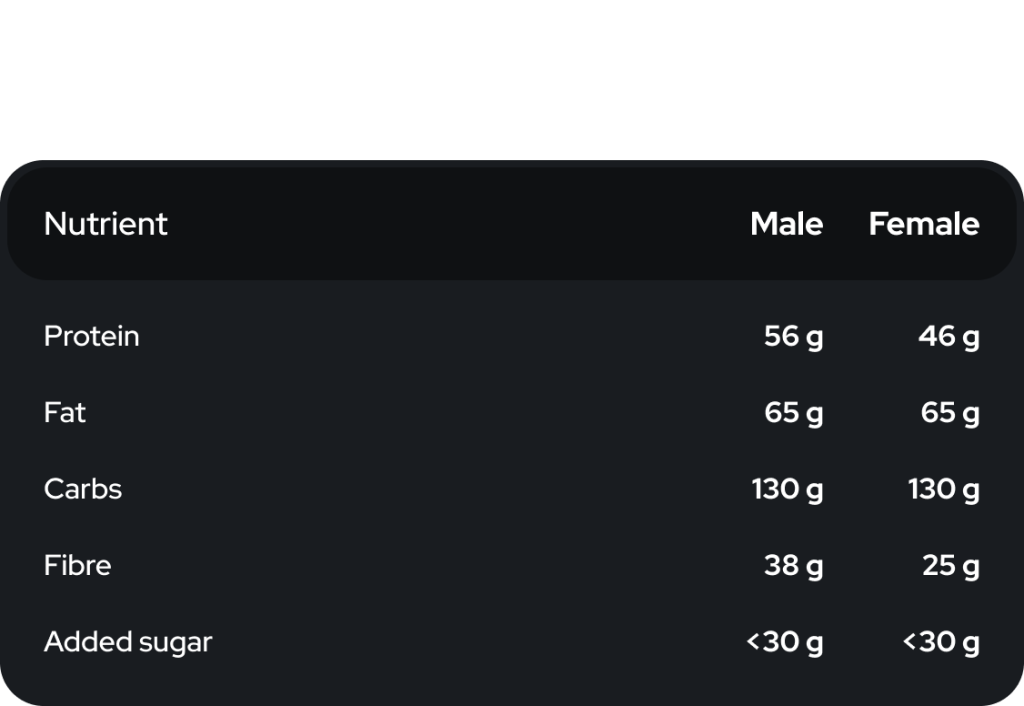Why it is important to monitor nutrient intake?

Understanding and adhering to daily nutrient intake recommendations is crucial for maintaining overall health and preventing nutritional deficiencies. It can also play a role in the management of chronic diseases and optimise the body’s functionality under varying conditions like stress, physical activity, or illness.
What nutrients do we need every day?

The daily nutrient intake involves a balance of essential nutrients which include but are not limited to vitamins such as A, C, D, E, K, and B-complex, minerals like calcium, iron, magnesium, and zinc, as well as macronutrients like carbohydrates, proteins, and essential fatty acids.
How to better receive all these nutrients?

It is recommended to meet daily nutrient needs through a varied diet that includes a mix of fruits and vegetables, whole grains, lean proteins, healthy fats, and adequate water intake. Specific nutrients may require more attention depending on individual circumstances, such as vitamin D from sunlight exposure and vitamin B12 for those on plant-based diets.

%DV – Percent of Daily Value

Daily Values or DVs were developed by the U.S. Food and Drug Administration (FDA) to help consumers determine the level of various nutrients in a standard serving of food in relation to their approximate requirement for it.1
Here, at HealthSpan+, we calculate each nutrient percentage of daily value based on the Dietary Reference Intakes (DRIs) established by the Health and Medicine Division of the National Academies of Sciences, Engineering and Medicine. The data represents the most current scientific knowledge on nutrient needs.
The table provides the %DV in each meal, so that you can see how much (what percentage) each dish contributes to reaching the DV.
Individual requirements may be higher or lower than DRI recommendations.
Daily Recommended Intakes (DRI)

The norm for daily intake of different nutrients varies depending on various factors including age, sex, weight, activity level, and particular health concerns.

Source: National Institutes of Health
What are the macronutrients?

Proteins are fundamental building blocks of the body. They are involved in growth, repair, immune function, and as enzymes and hormones. Proteins are also critical for maintaining muscle mass, especially as one ages, and play a role in satiety when it comes to dieting and managing hunger levels.
Fats are an important part of a healthy diet due to their role in energy storage, insulation, protection of organs, and hormone synthesis. They are necessary for the absorption of vitamins such as A, D, E, and K. Additionally, fats contribute to the maintenance of healthy skin and hair, brain health.
There are different variations of dietary fats, which can be classified as ‘good’ and ‘bad’ fats. The ‘good’ fats, or unsaturated fats, include monounsaturated and polyunsaturated fats, which are beneficial for heart health and can reduce the risk of disease.

Carbs or carbohydrates serve as a primary source of energy for the body. Carbohydrates also play a crucial role in various bodily functions, including supporting the central nervous system, aiding in digestion.
There are two main types of carbohydrates: simple carbohydrates (sugars) and complex carbohydrates (starches and fibre). While complex carbohydrates, found in whole grains, fruits, and vegetables, are generally beneficial for health due to their fibre content and nutrient density, excessive consumption of simple carbohydrates, particularly added sugars, can lead to health issues.
Fibre supports digestive health by preventing constipation and promoting regular bowel movements. It plays a key role in weight management by enhancing feelings of fullness and can aid in controlling blood sugar levels, making it particularly beneficial for individuals with diabetes. Additionally, fibre contributes to heart health by lowering cholesterol levels and supporting a healthy gut microbiota, which is linked to various aspects of well-being.
Why it’s important to control sugar intake?

Excessive sugar consumption can lead to weight gain, increase the risk of type 2 diabetes and heart disease, contribute to dental issues, and negatively impact energy levels and mood. It may also strain the liver, promoting non-alcoholic fatty liver disease, and is linked to chronic inflammation.
How to reach daily intake goals?

While a diverse diet is typically the best way to achieve these goals, certain conditions may necessitate supplementation. It is important to tailor nutrient intake to individual needs and circumstances and to seek professional advice when considering nutritional supplements to achieve optimal health.







